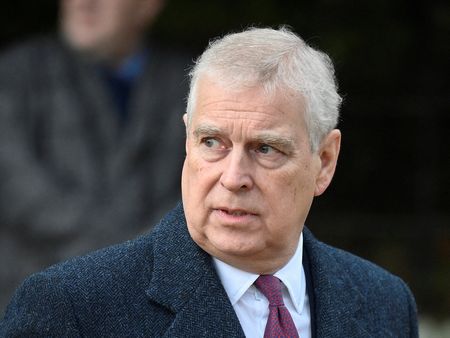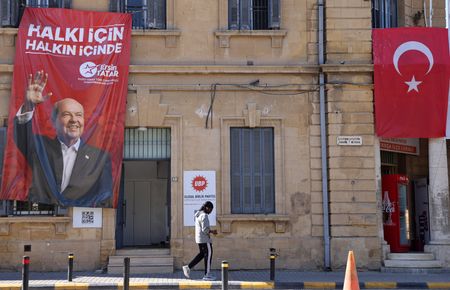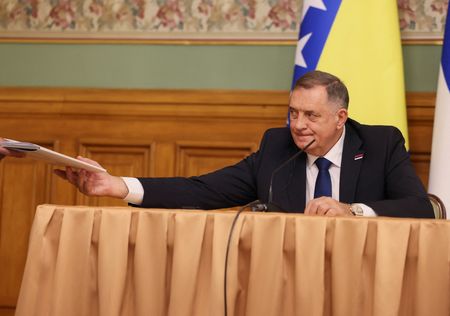By Alexander Cornwell
TEL AVIV (Reuters) – British anti-immigration campaigner Tommy Robinson said he believes the Reform UK party is poised to win Britain’s next general election, even as he questioned the credibility of its leader, Nigel Farage.
Addressing an audience in Tel Aviv on Saturday, Robinson, who rose to prominence in Britain more than a decade ago by organising protests against Islam, was met with a standing ovation before a two-hour speech criticising immigration, the media and the British government.
“I think Reform will win the next election,” he said of the populist right-wing party that holds just five of the 650 seats in Britain’s parliament but is leading in public opinion polls.
‘WE HAVE TO PUSH NIGEL FARAGE’
Robinson’s prediction for the general election, to be held by 2029, drew loud applause. But he also told the audience, which included members of Israel’s government, that he doubted Farage would be a “great friend of Israel”.
“He is the best we have. But I think we have to push Nigel Farage,” he said. “Nigel will go whichever way the wind flows.”
Robinson, 42, whose real name is Stephen Yaxley-Lennon, said he did not want to get into a “slagging match” but then cited past comments by Farage, who helped champion Britain’s exit from the European Union, warning against politically alienating Britain’s Muslim community.
“How do you not alienate the Islamic community? You’re going to have to throw the Jews under the bus,” Robinson said, before repeating that he expected Reform would win the next election.
“But if you’ve got a leader already putting up the white flag to a hostile community, then it doesn’t bear much hope in Nigel Farage unless he’s pushed and forced by public opinion.”
Farage and Reform UK did not immediately respond to requests for comment outside business hours.
Immigration has become one of Britain’s most contentious political issues, overshadowing concerns about the faltering economy. Farage has pledged to make it harder for foreign nationals to move to the country, while the Labour government has unveiled measures aimed at tightening migration rules.
Robinson in September organised a nationalist rally in London that attracted more than 100,000 people, with some demonstrators carrying signs with anti-immigration slogans.
HECKLER ATTACKED, REMOVED FROM SPEECH VENUE
In Tel Aviv, Robinson said that, like “every single Western nation”, Israel was being “flooded with migration”, referring to thousands of Sudanese and Eritrean asylum seekers in the country.
He criticised the British government’s recent decision to recognise the State of Palestine and spoke about his admiration for Israelis as he stood in front of a backdrop featuring the UK’s Union Jack and an Israeli flag.
Shortly after he began speaking, a man interrupted, shouting that Robinson was a racist. Several people in the audience attacked the heckler as security removed him from the venue, with some following the man outside, punching and kicking him.
The event otherwise passed without incident as Robinson spoke to an audience that frequently applauded and cheered, at times chanting “Tommy, Tommy Robinson”.
He also criticised Qatar, which has been a frequent target of criticism by the Israeli government but is a close U.S. ally and has mediated between Israel and the Palestinian militant group Hamas.
Organisers had said more than 1,000 people were expected to attend the event with Robinson, who thanked the Israeli government for inviting him to Israel.
The Board of Deputies of British Jews, an organisation representing the Jewish community in the UK, has criticised the Israeli government’s decision to invite Robinson, who it has described as “a thug who represents the very worst of Britain”.
On Saturday, Robinson dismissed the group as not being representative of Britain’s Jewish community. He described himself as a journalist and said it was wrong to call him far-right, citing his support for Israel.
Robinson went on trial in Britain last week, accused of refusing to give police his phone PIN when stopped under counter-terrorism laws. He has called the trial “absolute state persecution” and said billionaire Elon Musk was funding his defence.
(Reporting by Alexander Cornwell; Editing by William Mallard)











